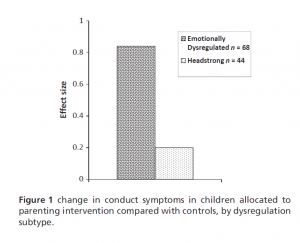In classic models of psychiatric risk, particular child characteristics are seen as generally negative things that under the wrong conditions can get amplified into full-fledged psychiatric disorders. A newer model, however, holds that some of these characteristics are better understood as related to environmental sensitivity, which means that in positive environments these same traits may convey an actual developmental advantage. A new study published in the November 2012 edition of the Journal of Child Psychiatry and Psychology tests the hypothesis that children with emotional dysregulation would show a greater improvement to a parental guidance intervention than those without such behaviors.
The data come from 112 children who participated in the SPOKES project in London, England. The children were between 5 and 6 years old and possessed elevated levels of oppositional and conduct behavior as assessed through questionnaires and the DSM ODD criteria. Subjects were further sorted into an Irritable, Hurtful and Headstrong group based on previous research by Stringaryis with the Hurtful and Irritable group designated as Emotionally Dysregulated. Families were then randomized with half of the parents participating in a parenting intervention based on the Incredible Years program.
The results revealed that while the treatment improved parenting behaviors similarly in both child groups, only the Emotionally Dysregulated group and not the Headstrong Group had a significant improvement in child conduct problems.
The authors concluded that emotional dysregulation in children may reflect a genetically influenced trait that reflects a heightened sensitivity to the environment which under positive conditions could result in more robust improvement.
However, from my reading it does seem to be a bit of a stretch to conclude that emotional dysregulation should be viewed purely as environmental sensitivity based on improved treatment response. More convincing would be data that show that children with this disposition, under positive rearing conditions, are actually more well than their less sensitive peers rather than doing less poorly as these data suggest. Nevertheless, this study offers hope that many children who are prone to emotional dysregulation can be significantly helped though improving the quality of their home environment.
Reference,
Scott S, O’Connor TG. An experimental test of differential susceptibility to parenting among emotionally dysregulated children in a randomized controlled trial of oppositional behavior. J Child Psychiat Psychology 2012; 53:1184-1193.
Tags: conduct disorder, ODD, parenting

